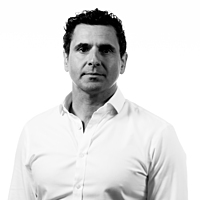4 themes and 4 funds for the next decade
In decades gone by, Australian investors invested in property, 'blue chip' Australian shares, and not much else. But that's all changed now, as we increasingly look offshore and to innovative solutions. While international fund managers like Magellan were once pioneers of an underappreciated asset class, today they form a core of many Australian investor's portfolio.
David Clark from Koda Capital is uniquely positioned to see these trends, with decades of experience dealing with both clients and fund managers. Today, he sees opportunities in areas like biotechnology and medical devices, sustainable agriculture, technology in China, and impact investing.
In this Q&A, he discusses four funds offering exposure to these themes. He also explains why he's cautious of valuations in the tech sector, and shares his advice for those investing for the long term.

What gets you really excited about the future of innovation, disruption and ESG impact investing, and in which parts of the market?
The effects that COVID-19 is having on economies, people around the world and investment markets, has been quite dramatic. Some parts of the market have gone up rapidly, others have fallen rapidly. When there's change like that, and also very different views, many people often sit on lots of cash. Then this rotates again when they rapidly deploy this cash seeking growth, with a big divergence of views on how to do this.
That creates all sorts of opportunities. This can create dislocation, for example in unlisted infrastructure. This is an asset class that is traditionally very hard to buy into. Assets such as regional airports are great long term assets, COVID 19 has presented an opportunity to gain exposure at what we feel will be an attractive prices. There are some very good opportunities out there.
There are a lot of new products coming to market in the impact investing and philanthropic sectors. It’s very exciting as people are not only focused on investment returns, but also focused on the good that their wealth can do. COVID 19 has resulted in many investors re-evaluating what’s important to them. It’s an exciting time. Whenever you have that sort of divergence and dislocation going on in markets, there are all sorts of opportunities.
Are there any sectors you don't want to be in at the moment?
While we see an enormous amount of change happening rapidly in digital technology at the same time we’ve seen companies in these high growth areas run very hard. We absolutely think that there has been a dislocation in fundamentals in many of those areas. When you look at some of the valuations on those assets, they don't pass the sniff test.
To us, it feels very much like 1999, coming into the tech bubble, where people were saying ‘but this time is different’.
For example, we've got a client with a large position in Square POS technologies. Over the last six months this has run from $100 to $260. But is it a two-and-a-half times better business now? Probably not.
What are you looking for in a fund manager?
It comes back to the alignment of interests. We don't want to see closet index tracking, we want to see high conviction.
If their mandate is restrictive, we don't want them to have to research an industry only to find out that the best company is from a New Zealand, for instance, and outside their mandate. If they can't execute on that because of their mandate, that doesn’t make sense to us.
Taking a 10-year view, which Australian funds or companies would you single out as the most progressive? What are the most interesting areas of high growth, innovation, and ESG impact?
I think overarching some of the themes in the Australian market, we'd have small caps versus large caps. When you look at the Australian market, we think it's dominated by a handful of banks, a couple of retailers, and a couple of large miners. When you put a lens of innovation across that, which do you think are under attack, and from what? Are some under attack from innovation?
We prefer exposure to small companies that we think are going to have a good time competing against the incumbents of the world, because it's much easier today to compete against Telstra today than it was 30 years ago.
In the impact space, and also among financials, we quite like some areas of agriculture. For example, Kilter Rural in the small cap space. It was interesting to see someone like Phil King from Regal invest in Kilter Rural.
Kilter is well placed given its management and experience. When you look at a couple of its investments themes, whether in the water area or land management farming, you can see that there are positive ecological outcomes. They start to tick the boxes.
We have to recognise that if you are looking for exposure to innovation and disruption, limiting yourself to the Australian market doesn't make a lot of sense in today's world. For example, media is dominated by a couple of large multinationals in Facebook and Alphabet, whereas in the past you would have had multiple Australian news organisations dominating the local media landscape. It's much more a winner-take-all scenario. Yes, there will be a level of de-globalisation from COVID as people look to secure their internal supply chains.
Taking a look around the world, there’s a fund focused on biotech and medical devices called IBEX. We think you can access this innovation and technology at far cheaper prices than what you'll see on the NASDAQ.
Israel has something like 20% of the world's cyber security market with 0.01% of the world's population. Because it's an area that a lot of investors aren't comfortable with or don't understand, you can get valuations a lot cheaper.
In China we think a fund called Brilliant is very appealing. It has a great track record on both the long and the short side. We believe the technology and innovation coming out of China is only going to continue.
On the impact side of things, we like Regnan Crimp Fund. It has a credit impact trust that we believe offers reasonable returns. It is also very strong on green and impact investing.
They’re some of the opportunities I believe are pretty attractive over the next 10 years.
How is this faster pace of innovation reflected in the conversations you have with clients now versus a few years ago?
I think it's become much more real. Typically a lot of Australians have built wealth and managed wealth through exposure to property, and what they would have termed 'blue-chip' shares. They were highly nervous about anything international.
But if you look at the Magellan Al advertising campaign, for instance, it strikes me – in a very succinct, nice way – the fact that many of the things we use in Australia are from international sources. You're starting to see people become much more comfortable with some of these investment themes and ideas. As their day-to-day lives are involving these technologies and innovations, it's almost becoming a fait accompli. Yes, of course we would have exposure to some of these things that we use day-to-day, whereas in the years gone by, there would have been a high resistance to that.
Some people might say “my dad always said, you're not going to lose your money in blue-chip Australian shares”. But those attitudes are rapidly changing and it's interesting to see how quickly they can change from a position of ‘no, no, I would never do that’ to one of ‘I'm totally uncomfortable with that too, that makes complete sense’.
If someone came to you today and said ‘I want more exposure to the long-term’ in two or three points, how would you respond?
I’d say you have to be careful exactly where you're placing that, because some valuations just don't make sense. At the same time, you probably want to take a staged approach with it, and you want to be comfortable that they're assets with future cashflow prospects that you want to own in five to 10 years’ time. Not assets that you're purely looking to buy on the expectation that you think somebody will buy it off you tomorrow for a higher price. We believe this is, in some instances, what is happening in the market today.
A great investing podcast
David Clark hosts a great investing podcast called Inside the Rope. Living in rural Australia means I regularly make the four hour drive to Sydney for work commitments. Inside the Rope is a staple on my playlist and David goes off the beaten track to interview some really smart fund managers. If you're an investing nerd this is one podcast you should check out.
If you enjoyed this wire give it a like and hit follow on my profile to be alerted each time I publish fresh content.
1 topic
1 contributor mentioned

